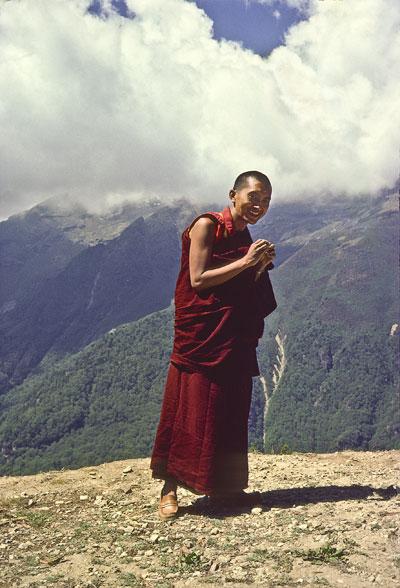Dear Friends,
Thank you so much for your kind interest in our monthly eletters. Please feel free to share them far and wide!
Well, 2020, a year for the ages (preferably past) has nearly gone. The good news is that 2021 is nearly here. It's a bit hard to see how it could be any worse, but in samsara, we never know.
However, before we're finally done with this year there's one more thing! Our annual year-end appeal. First, I really want to again thank everybody who has ever contributed to the Archive. Your support is the only way we can keep doing what we do. Thank you so, so much! In particular, I'd like to thank all of you who have contributed so far this year, especially recently for Lhabab Duchen. Your donations have been so important in keeping us going this difficult year. Thank you.
This year our goal is $50,000, and so far we have received about $10,000, for which we are extremely grateful. If you possibly can, please help us hit our target so that we can get the new year off to a flying start. Thank you again.
From the Video Archive: The Root of Samsara and The Path to Liberation
This month from the video archive Lama Zopa Rinpoche begins this 1989 teaching by chanting the mantra of the Buddha of Compassion OM MANI PADME HUM. Rinpoche then takes questions from the students and in response explains in detail how the conceptual root of all samsara is ignorance. Rinpoche then explains how to attain total liberation from samsara by meditating properly on the words and meaning of the Heart Sutra and emptiness. These experiential teachings were given in November, 1989 at Thubten Kunga Center in Boca Raton, Florida.
Visit and subscribe to the LYWA YouTube channel to view dozens more videos freely available from our archive. See also the FPMT YouTube channel for many more videos of Lama Zopa Rinpoche’s teachings.
On the LYWA Podcast: The Shortcomings of Desire
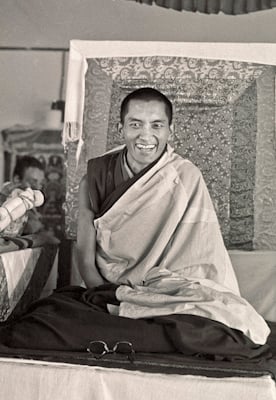 Desire will be there all the time, but on top of that there is more anger. So much of the problem is desire; it is really the whole world’s problem.
Desire will be there all the time, but on top of that there is more anger. So much of the problem is desire; it is really the whole world’s problem.
—Lama Zopa Rinpoche
On the LYWA podcast this month are more teachings given by Lama Zopa Rinpoche at the 36th Kopan Meditation Course, held at Kopan Monastery, Nepal, in 2003. In this session, Rinpoche discusses how we must understand how pervasive compounding suffering permeates everything we experience with dissatisfaction. Without understanding this, we can never remove our suffering completely and instead will wander mindlessly in ignorant darkness driven by endless desire. But with Dharma wisdom, no matter where we go we will always find success. You can read along with the lightly edited transcript of these teachings.
The LYWA podcast contains hundreds of hours of audio, each with links to the accompanying lightly edited transcripts. See the LYWA podcast page to search or browse the entire collection by topic or date, and for easy instructions on how to subscribe.
WHAT'S NEW ON OUR WEBSITE
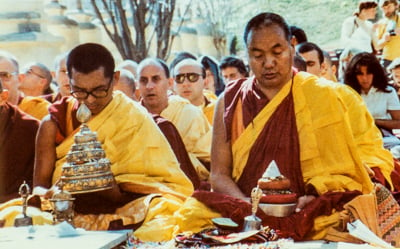 We are delighted to announce we will be sharing videos selected from the FPMT's Essential Extracts teaching series on our website. This month’s video is The Importance of Offering to Holy Objects, a teaching by Lama Zopa Rinpoche at Istituto Lama Tzong Khapa, Italy, in October 2017. You can watch the video and read along with the simultaneous transcript on the FPMT YouTube channel, or alternatively, you can watch the video without the transcript. Visit the FPMT’s Essential Extracts webpage to browse the entire collection of videos on a range of topics.
We are delighted to announce we will be sharing videos selected from the FPMT's Essential Extracts teaching series on our website. This month’s video is The Importance of Offering to Holy Objects, a teaching by Lama Zopa Rinpoche at Istituto Lama Tzong Khapa, Italy, in October 2017. You can watch the video and read along with the simultaneous transcript on the FPMT YouTube channel, or alternatively, you can watch the video without the transcript. Visit the FPMT’s Essential Extracts webpage to browse the entire collection of videos on a range of topics.
For students who wish to explore the teachings more deeply, we are now offering a Study Pack, a new multi-pack selection featuring five popular LYWA titles. This amazing offer is priced at just US$10, plus postage.
Also new on our website this month is a teaching about rejoicing by Lama Zopa Rinpoche, compiled and edited by Ven. Sarah Thresher. Rinpoche says rejoicing, which is the genuine feeling of happiness and joy in the good qualities in oneself and others, is a simple way to achieve enlightenment. The teaching includes an outline showing how to practice rejoicing in the merits created by oneself, other sentient beings, bodhisattvas and buddhas respectively.
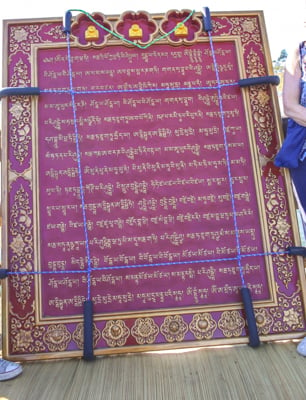 As always, we have new additions to Lama Zopa Rinpoche's Online Advice Book to share with you:
As always, we have new additions to Lama Zopa Rinpoche's Online Advice Book to share with you:
- Renouncing Attachment to a Monk: A student wrote that she had fallen in love with a monk. Rinpoche responded with advice about renunciation, which can’t co-exist with attachment. Rinpoche also recommended lamrim study and practice.
- Purifying the Karma of Killing Many Fish: Before taking refuge, a student was a commercial fisherman and had killed over 500,000 fish. Rinpoche recommended several purification practices and advised how he and Sangha were blessing all sentient beings in the ocean with Namgyalma mantra boards and blessed water.
- The Story of Swayambhunath Stupa: This letter was sent to an old student a few weeks after Rinpoche had manifested a stroke while in Bendigo, Australia, in April 2011. Rinpoche begins with a teaching on transforming sickness and then discusses the legend of Swayambhunath, a sacred site in Kathmandu, Nepal.
- Don’t Be Afraid of Death: A student was experiencing ill-health, had lost weight and was feeling weak and tired. A geshe had told the student that death was approaching. The student was afraid to die and asked Rinpoche for advice.
For our teaching this month we are sharing an excerpt from a recent book by Lama Zopa Rinpoche, edited by LYWA's Gordon McDougall and published by Wisdom, Bodhichitta: Practice for a Meaningful Life. In this book, Lama Zopa gives a clear and comprehensive explanation of bodhichitta, its benefits, and its importance to the path. Enjoy!
LYWA's year-end appeal
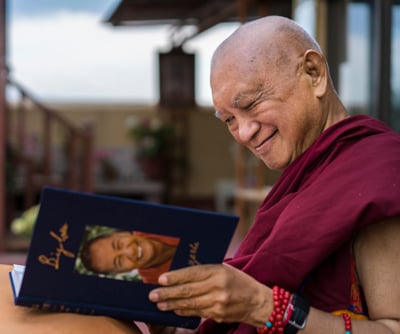 Finally, if you didn't click on our year-end appeal link above, here it is again! Please check it out. As I say, in order to do the Dharma work we do for the sake of all sentient beings, we need your support. Sentient beings in samsara are suffering. So are we. But we have found the solution to suffering, Buddhadharma, and although it takes time, we are on the way out. Given that, it's our responsibility to share the Dharma with others to bring them with us. Here at LYWA we have so much Dharma to share and it's your support that can make it happen. We are partners in this enterprise and we are so grateful to you for playing your part!
Finally, if you didn't click on our year-end appeal link above, here it is again! Please check it out. As I say, in order to do the Dharma work we do for the sake of all sentient beings, we need your support. Sentient beings in samsara are suffering. So are we. But we have found the solution to suffering, Buddhadharma, and although it takes time, we are on the way out. Given that, it's our responsibility to share the Dharma with others to bring them with us. Here at LYWA we have so much Dharma to share and it's your support that can make it happen. We are partners in this enterprise and we are so grateful to you for playing your part!
Thank you so much.
Big love,

Nick Ribush
Director
THIS MONTH'S TEACHING: What Is Bodhicitta?
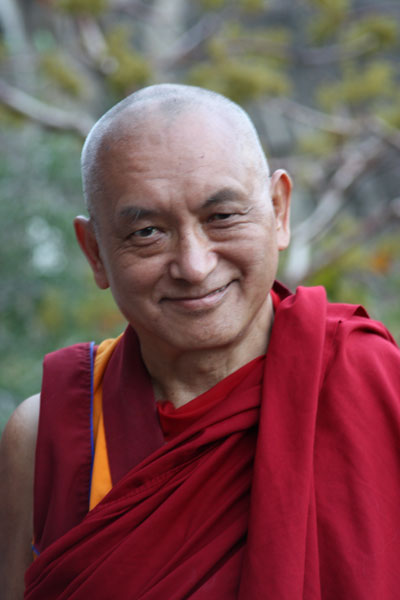 Bodhicitta is such an incredible mind. It is the thought to benefit every single sentient being, without exception, without excluding one single hell being, one single hungry ghost, one single animal, one single human being, one single demigod, one single god. It is the thought to benefit every being on the ground, in the ground, in the sea, in the air—every ant on every mountain, every fish in every ocean, every bird and insect in every field, every single sentient being in all the six realms.
Bodhicitta is such an incredible mind. It is the thought to benefit every single sentient being, without exception, without excluding one single hell being, one single hungry ghost, one single animal, one single human being, one single demigod, one single god. It is the thought to benefit every being on the ground, in the ground, in the sea, in the air—every ant on every mountain, every fish in every ocean, every bird and insect in every field, every single sentient being in all the six realms.
Bodhicitta is a Sanskrit word that means the mind of enlightenment or the awakening mind: bodhi, meaning “awakened” or “awakening,” and citta, meaning “mind.” The Tibetan for bodhicitta is jangchup sem: jang, meaning the “elimination,” as in the destruction of all gross and subtle obstacles; chup, meaning “development,” as in fully developing or perfecting all the mind’s positive qualities or realizations; and sem, meaning “mind.” This mind that strives for enlightenment completely, spontaneously, continuously works at nothing other than benefiting all living beings. A person who possesses such a priceless mind is called a bodhisattva.
Before we reach that spontaneous altruistic mind, we must consciously think of reasons to induce this state, and so that type of bodhicitta is called effortful bodhicitta or contrived bodhicitta. When the uncontrived and spontaneous wish for enlightenment always manifests, then it is effortless bodhicitta.
Effortful bodhicitta relies on reasoning, using logic and quotes from the scriptures to reinforce our wish to benefit others. We logically understand all the arguments, and in meditation we feel we must attain enlightenment for all other beings. But that state of mind is not integral yet, and so we slip out of it when we are not analyzing the reasons or meditating on it. Without relying on reasoning, we are still not able to transform our mind into a totally altruistic one. This is why effortful bodhicitta is also called created bodhicitta.
Effortless, uncontrived, or uncreated bodhicitta, on the other hand, does not rely on reasoning. We no longer have to dwell on how all sentient beings are suffering, how they are devoid of happiness and incapable of lifting themselves from this state, and how we alone are able to help them. Even without reasoning, that deep wish to help is naturally there.
Effortful bodhicitta is compared to licking sugarcane skin; by meditating on bodhicitta through reasoning, we might get a strong feeling for the suffering of sentient beings—the taste might be there—but after the meditation that feeling does not remain. On the other hand, the actual mind of bodhicitta that arises through continuous training is like licking the actual sugarcane pulp. Whereas the skin might have a little sweetness due to the pulp inside, the actual pulp is so sweet, so delicious. That is what we actually want to eat. This mind of effortless bodhicitta is so precious, so wonderful.
This is an excerpt from Bodhichitta: Practice for a Meaningful Life by Lama Zopa Rinpoche, edited by LYWA's Gordon McDougall and published by Wisdom.
























